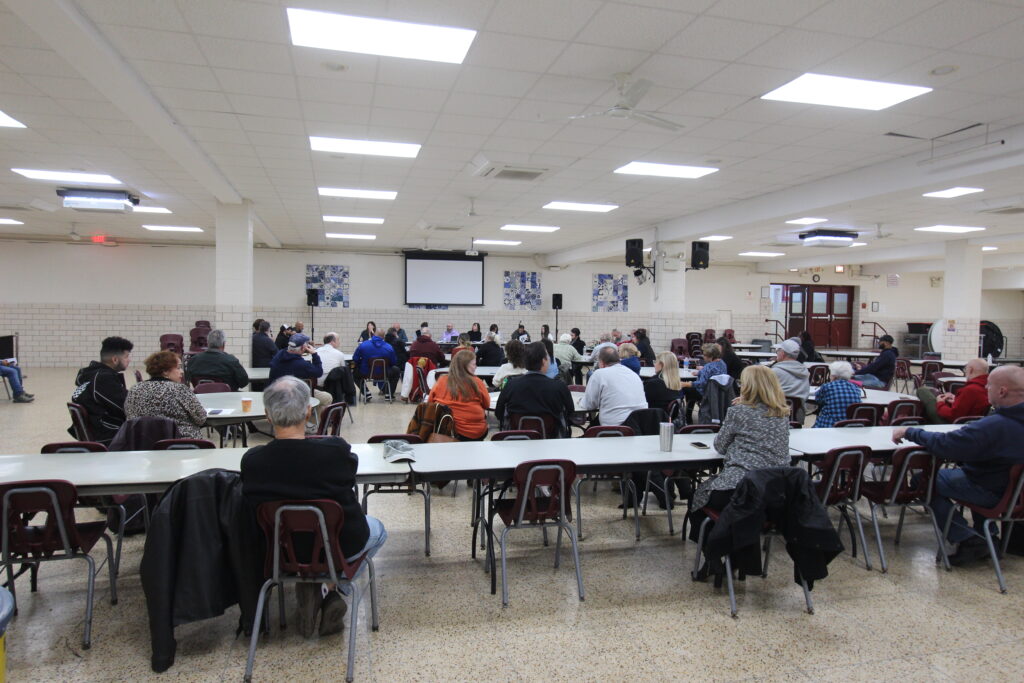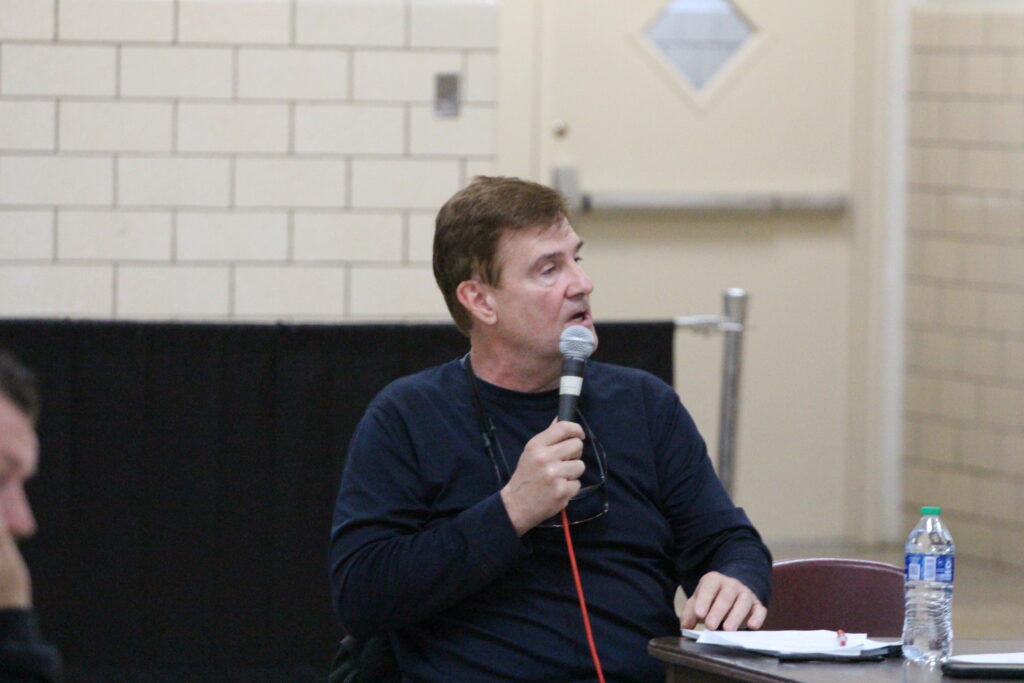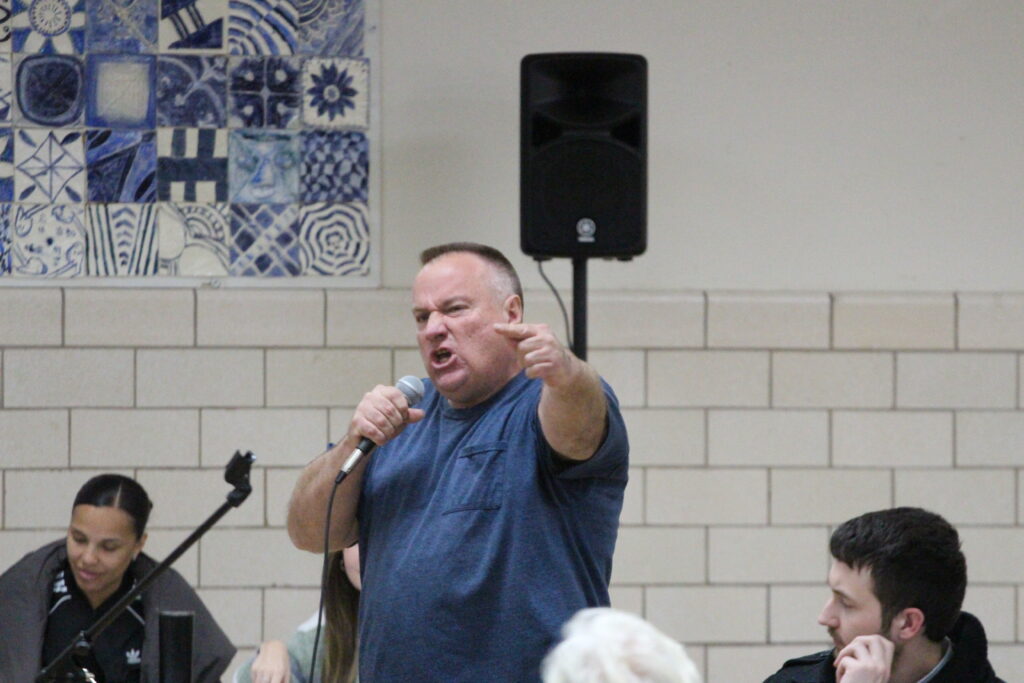By Celia Bernhardt | cbernhardt@queensledger.com
Things got heated at Community Board 5’s Liquor License and Cannabis Committee meeting on Nov. 1.
Two applicants for cannabis licenses in Maspeth and Glendale came to the meeting to introduce themselves, receive feedback and attempt to make their case for why they should be approved by the Board. Community members didn’t take kindly to either. Nearly fifty people attended the Community Board’s Cannabis Committee meeting, held at Christ the King High School in Middle Village.
The first to present, Masood Weish, had filed an application for 70-24 Myrtle Ave in Glendale. The second, Bryan Whalen, applied for 64-01 Grand Ave and for 63-09 Flushing Avenue in Maspeth, though the meeting focused on the Grand Ave location. Both Maspeth spots were previously Valley National Bank locations.
Much of the controversy throughout the evening’s proceedings surrounded these locations’ distances from local schools and churches. Ultimately, the committee voted to not approve either applicant.
Applications for the general population to obtain a cannabis license opened up in early October, setting loose the floodgates on community boards across the city tasked with reviewing hopeful merchants’ applications before the state’s Office of Cannabis Management makes the ultimate decision. While areas like Maspeth have relatively few applications in comparison to boards in downtown Manhattan fielding over 20, Community Board leaders still say the brand-new process has been overwhelming.
The night began with the board informing the crowd that all applicants for 56-40 Myrtle Avenue had withdrawn. Next, the mic was turned over to Weish.

The meeting took place in Christ the King High School’s cafeteria.
Weish told the crowd that he was primarily involved in real estate and in the Edible Arrangement franchise, but was driven to get involved in the cannabis industry after his son started using marijuana acquired from unregulated smoke shops at age 18.
“He was consuming and taking stuff that was really unlicensed, moldy, all kinds of pesticides,” Weish said, explaining that it might him realize that state-regulated cannabis stores were an important option.
Weish went on to say that because the products he would sell are relatively expensive, as opposed to the cheap prices some unregulated stores peddle, his store would not bring in any “bad traffic of people.”
“I believe in my heart that it’s a great thing that the city is doing this. There’s no way of stopping this anyway,” Weish said. “I’m next to the McDonalds and a gas station. When you look at the neighborhood where I’m at, there’s a lot of stores closing…by us coming to the area, it’s going to bring all the businesses foot traffic.”
Weish said that the other applicant for this location had withdrawn, and that he had plans to sign the lease on the location that day, after the meeting concluded.
When asked about advertising, Weish said “my understanding was that we’re not allowed to advertise. I believe the city of New York just does it with emails, and that’s it.”
Then, the first back-and-forth of the night about distance requirements began. When asked by a committee member about distance to “the school,” Weish asserted that it was over 500 feet—the minimum requirement.
“We did different ways of measuring it. It’s over 500,” Weish said. A few attendees from the public in the crowd called out, saying “It’s not over [500].”
A board member asked which school Weish was thinking of. “I’m not sure the name of the school,” he said, “but I know it’s on 69th street.”
“I think you’re measuring to P.S 91 and not considering the fact that Redeemer Lutheran is closer,” the board member said. “If it’s not 500 feet, it makes this application void. But you have to be conscious that there is a school there, and your measurement is to 91, not to Redeemer Lutheran.”
“Okay, if it is, then we wouldn’t accept it,” Weish said.
“It’s 497 feet,” someone called out from the crowd.
After a couple additional questions, the meeting shifted to Whalen and the proposed Maspeth locations. He went to great lengths to emphasize his connections to Maspeth.
“My wife attended this very cafeteria in this school,” Whalen said. “We owned a house for 16 years at 78-36 68th road in Maspeth. We also lived on Dry Harbor road. My wife is originally from Ridgewood…We have strong ties to the community.”
Whalen explained that although his family did not partake in cannabis recreationally, his wife used it medicinally to treat her Lupus symptoms.
He then shifted his focus to security, telling the crowd that his store would feature armed security guards and a “scanner test” like one might see in an airport. He also said the store would strictly enforce rules against double-parking, lock up all products in a safe and ensure that no one under 21 entered the store.
Whalen said that according to several different online map softwares, his store would be 608 feet away from the closest school.
“My wife has reached out to six different organizations including the school down on Grand Avenue, and we want to be an active part of the community and have feedback from the community,” he said.
Catherine Mangone, Principal of St. Stan’s, said after the meeting that contrary to Whalen’s statements while presenting to the board, “there was no effort made to speak to us or anyone at my school.”

Whalen addresses the Committee.
The first question from the committee recentered the discussion on distance regulations.
“Why would you put it so close to St. Stan’s and Martin Luther? What made you choose that location?” committee member Maryann Lattanzio asked.
Whalen said that he attempted to stay as far away from schools as possible, but that locations available were “few and far between” due to what he said was, “larger corporations monopolizing commercial spots.” He switched gears to argue that opening a legal cannabis store would ultimately improve safety in the community and decrease students’ access to the drug.
“The greatest potential here for not having our kids [consume it] is once, you know, all these cartels and what not who’re shipping it in and they bring the gun violence in—once it’s a legal shop, you’ll deteriorate their input financially, you’ll choke them off at the at the money supply. And so anybody can buy pot…if they’re gonna do it, they’re gonna do it. The kids, though, will be unable to buy at the legal places.”
CB5’s Cannabis Committee Chairman Patrick Trinchese spoke next, listing out the many religious and educational institutions that the location was close to, though not too close by law.
“I just think with all of that surrounding it, it’s just a rough location to put it in,” he said.
He then asked Whalen if he had moved away from the area, to which Whalen replied “No, I live in Forest Hills. 68th Avenue.”
“Why in Maspeth?” Trinchese asked. “Why us?”
“Maspeth, again, is my home,” Whalen said. “No it’s not!” multiple people yelled from the crowd.
After speaking at length about the importance of legal establishments and the difficulty of finding available locations, Whalen emphasized again that “if it’s legal, the kids won’t have access to it.”
Lattanzio responded “I’m not so sure about that,” while laughter and sarcastic comments came from the public.
Later, Whalen was asked how he would ensure that customers wouldn’t walk over to St. Stan’s after purchasing cannabis and smoke in front of the school. Whalen said that as smoking cannabis on the street is illegal, that would be a “police issue”—to yet another bout of loud heckling from the crowd. He added that he could enforce OCM’s regulations if something happened within reach of the store’s external security cameras.
The committee opened the floor to public comments. Mike LoCascio, a resident of Maspeth, testified first.
“You don’t know me too well. I can rally troops. You don’t want to open that store there,” LoCascio said, to applause from the audience. “I don’t mean to sound out of control, but you guys know what happened with the homeless shelter. I will rally the troops like nobody’s ever seen. Not a single person will walk in that store ever, I promise.”
Charlie Vavruska gave a passionate speech. “Any society that doesn’t protect children will soon face demise,” he shouted.

Vavruska giving an impassioned speech.
Elizabeth De la Cruz raised concerns about the proximity of the first store to the McDonalds, where she often takes her two-year-old grandson and sees many young kids hanging out. “Like the other speakers, I beg of you,” she said, addressing the board, “Do not accept this application. We have small children.”
After public comments concluded, the committee voted swiftly to not approve either application.
The committee is set to report to the full board at its monthly meeting on Nov. 8, at Christ The King High School. That night the Community Board will vote on whether to approve or not approve the applications in their recommendation to the State. Ultimately, the final decision about the shops lies in the state’s hands.


